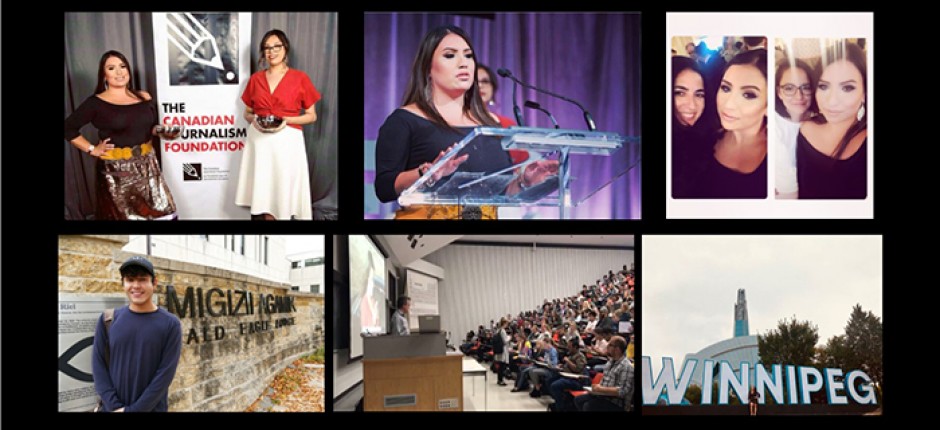By Ntawnis Piapot
- About
- J-Talks
- CJF Awards
- Award Categories
- CJF Hinton Award for Excellence in AI Safety Reporting
- CJF Award for Climate Solutions Reporting
- Lifetime Achievement Award
- CJF Dr. Eric Jackman Award for Excellence in Journalism
- CJF Tribute
- CJF Edward Burtynsky Award for Climate Photojournalism
- The Landsberg Award
- CJF Special Citation 2025: The Toronto Star
- 2026
- 2025
- 2024
- 2023
- 2022
- 2021
- 2020
- 2019
- Award Categories
- Fellowships
- CJF Indigenous Health Journalism Fellowship
- CJF Bursary for BIPOC Student Journalists
- CJF Black Journalism Fellowships
- CJF-CBC Indigenous Journalism Fellowship
- Jury
- CJF-CBC Indigenous Journalism Recipients
- 2025 CJF-CBC Indigenous Journalism Fellow
- 2024 CJF-CBC Indigenous Journalism Fellows
- 2023 CJF-CBC Indigenous Journalism Fellows
- 2022 CJF-CBC Indigenous Journalism Fellows
- 2021 CJF-CBC Indigenous Journalism Fellows
- 2020 CJF-CBC Indigenous Journalism Fellows
- 2019 CJF-CBC Indigenous Journalism Fellows
- 2018 CJF-CBC Indigenous Journalism Fellows
- 2017 CJF-CBC Indigenous Journalism Fellows
- 2016 CJF-CBC Indigenous Journalism Fellows
- 2015 CJF-CBC Indigenous Journalism Fellows
- 2014 CJF-CBC Indigenous Journalism Fellows
- Tom Hanson Photojournalism
- Research and Education
- CJF NextGen Creator-Journalists Training Program
- Research
- Digital deception now a ‘daily reality’ for nearly half of Canadians, new survey reveals
- Canadians want transparent media AI policy, poll says
- CJF & Maru Public Opinion: Media Literacy in the Age of AI
- Poisoned Well: Industry Roundtable on Journalists and Online Hate
- Canadians on Misinformation and Coronavirus
- Media Literacy
- The Shattered Mirror
- Supporters
- DONATE NOW

- About
- J-Talks
- CJF Awards
- Award Categories
- CJF Hinton Award for Excellence in AI Safety Reporting
- CJF Award for Climate Solutions Reporting
- Lifetime Achievement Award
- CJF Dr. Eric Jackman Award for Excellence in Journalism
- CJF Tribute
- CJF Edward Burtynsky Award for Climate Photojournalism
- The Landsberg Award
- CJF Special Citation 2025: The Toronto Star
- 2026
- 2025
- 2024
- 2023
- 2022
- 2021
- 2020
- 2019
- Award Categories
- Fellowships
- CJF Indigenous Health Journalism Fellowship
- CJF Bursary for BIPOC Student Journalists
- CJF Black Journalism Fellowships
- CJF-CBC Indigenous Journalism Fellowship
- Jury
- CJF-CBC Indigenous Journalism Recipients
- 2025 CJF-CBC Indigenous Journalism Fellow
- 2024 CJF-CBC Indigenous Journalism Fellows
- 2023 CJF-CBC Indigenous Journalism Fellows
- 2022 CJF-CBC Indigenous Journalism Fellows
- 2021 CJF-CBC Indigenous Journalism Fellows
- 2020 CJF-CBC Indigenous Journalism Fellows
- 2019 CJF-CBC Indigenous Journalism Fellows
- 2018 CJF-CBC Indigenous Journalism Fellows
- 2017 CJF-CBC Indigenous Journalism Fellows
- 2016 CJF-CBC Indigenous Journalism Fellows
- 2015 CJF-CBC Indigenous Journalism Fellows
- 2014 CJF-CBC Indigenous Journalism Fellows
- Tom Hanson Photojournalism
- Research and Education
- CJF NextGen Creator-Journalists Training Program
- Research
- Digital deception now a ‘daily reality’ for nearly half of Canadians, new survey reveals
- Canadians want transparent media AI policy, poll says
- CJF & Maru Public Opinion: Media Literacy in the Age of AI
- Poisoned Well: Industry Roundtable on Journalists and Online Hate
- Canadians on Misinformation and Coronavirus
- Media Literacy
- The Shattered Mirror
- Supporters
- DONATE NOW

2018 CJF-CBC Indigenous Journalism Fellow

Tansi,
I first want to give thanks to the staff at the Canadian Journalism Foundation who make the CJF-CBC Indigenous Fellowship possible. I want to say hiyhiy (thank you) for their tireless work to ensure there is Indigenous representation within Canadian newsrooms. It is not an easy task and it is a definite learning curve to make sure Indigenous storytellers have a meaningful (and enjoyable!) time during their fellowship at the CBC Indigenous Unit in Winnipeg. Kudos to them for making it all happen from the beginning: from choosing candidates, to coordinating the gala award ceremony in Toronto, to then making a conscious effort to follow up on the fellowship winners before, during, and after our individual journeys. Thank you once again.
It was immensely profitable to embark on my journey in advancing my online writing skills at CBC after working as a strict broadcast journalist for about five years. I found it personally nostalgic to return to Winnipeg where I worked as a National Correspondent for APTN National News for two years. It is not only a historical place that has cultural and spiritual significance to Indigenous people but is currently an Indigenous cultural hub filled with a vast array of Indigenous artists, musicians, academics, land and water protectors, a place of beauty and resistance: a territory that is beneficial to any curious, up-and-coming Indigenous journalist looking to hone their skills and spark their imagination. I want to give thanks to my colleagues whom I’ve met in person (or over the phone) for being there for me, giving me advice and/or storytelling guidance whenever I felt overwhelmed or stuck. Thank you to Jorge Barrera, Chantelle Bellrichard, Meagan Fiddler, and Lenard Monkman for putting up with my Cree antics while at the Winnipeg bureau. (Special shout out to Ify Chiwetelu who also made this Cree gal’ feel so welcome in the newsroom and was always full of generosity. Thank you!) Last but not least: to the amazing talent that is Connie Walker – a fellow female Saskatchewan storyteller who has always been a cheerleader in my corner from the beginning, encouraging me to share my story and reminding me that my voice (and yours) is needed in these newsrooms we find ourselves in. I am forever thankful for your presence in my life as you have always been an inspiration to us all.
//////
“During my fellowship, I am happy to say that I was given the creative freedom to take my story wherever it needed to go.”
//////
During my fellowship, I am happy to say that I was given the creative freedom to take my story wherever it needed to go – which meant a whirlwind trip to Saskatoon and back to Winnipeg, phones calls throughout the Prairies – and then back again. My story evolved with the help of Stephanie Brown (Senior Producer, CBC Indigenous Unit) which I am grateful for – she is an amazing talent that CBC is lucky to have. I was able to travel to the University of Saskatchewan to talk to students on the ground about their concerns and their thoughts on what true “Indigenization” of their campus looked like and meant to them – and their take on how to achieve it. Many interviews involved tears from Indigenous students that worked hard academically and held down jobs, yet still had to often choose between paying rent and getting groceries that month – all the while being away from the familiarity and security of their homes up north, and/or caring for young children. I got to sit in on a mandatory first year Indigenous Studies course at the University of Saskatchewan – led by a thought provoking, kind, yet fierce professor by the name of Rob Innes (who handed his class over to the educator and writer Winona Wheeler that particular day.) This helped me understand and see first hand exactly how (Indigenous and non-Indigenous) students felt about the Indigenization of their campus and how they felt about learning the history of the first peoples on Treaty 6 Territory.
I did the same process in Manitoba at the University of Winnipeg – a university that is leading the way when it comes to Indigenizing their campus and helping their Indigenous Student Association: when and where they need it. After speaking to many, many students about their concerns I took their views, questions and concerns to the University of Winnipeg, the University of Manitoba, and the University of Saskatchewan’s academic administration to get their responses. For my project I decided to take portraits of each student I spoke to. I attempted to capture the essence, strength, and resilience that came through the interviews we did and that beauty that embodies all Indigenous intellects – whether they be educated in a university setting or educated on the land. It was my first time using a DSLR camera and I am happy I took the initiative to do so because the pictures were what captured people’s attention first and what I received positive feedback on.
//////
“If you are like me and find yourself in newsroom after newsroom being the only Indigenous person there – own it. Speak your truth and stand up for your stories. Be visible, be humble, be generous, be unafraid, or be afraid, light your smudge.”
//////
To the upcoming fellows that will take on this opportunity in the future, I want to let you know: it will be a challenge professionally and personally… but in a good way! There will be times when you will think: is my story relevant? Do I have the right news hook? I’m running out of time! When will my sources get back to me? Who will share their story with me? (You know… All the ups and downs of creating a story that, let’s be honest: I think we journalists secretly enjoy and thrive on *wink) However, let me tell you: it will be fine. At the CBC, you will have access to a deep rooted, talented, and experienced roster of editors and producers who can talk shop your story with you until it is excellent and up to your liking. I will take this time to proudly announce that the CJF-CBC Indigenous Fellowship experience led me to gain immediate full-time employment as a reporter at CBC Saskatoon! I’d like to thank David Hutton, managing editor of CBC Saskatchewan for believing in me and my storytelling abilities.
If you are thinking of applying, please do so. You won’t regret it. If you are like me and find yourself in newsroom after newsroom being the only Indigenous person there – own it. Speak your truth and stand up for your stories. Not every story you pitch will be picked and not every story will turn out the way you idealize it, but you wake up everyday and you do it all over again: not only because you love it and it is in your blood – but because we need you. That little girl or boy from the ‘hood or from a remote, fly-in northern community who escapes their reality by writing needs to see You – being that kick ass reporter/editor/writer/VJ telling stories that matter to them. Be visible, be humble, be generous, be unafraid, or be afraid, light your smudge and do it anyway! I am proud to be a CJF-CBC Indigenous Fellowship Alumni and I will always support upcoming Indigenous (and non-indigenous) storytellers. Seek me out and I will do my best to help in any way that I can or point you in the right direction. This industry can be competitive and cut throat if you let it, yet most of the Indigenous journalists I’ve had the pleasure of meeting,working with, and becoming true friends with, understand that Kinship matters. Embrace each other – we’re all in this together, in a good way.
Ekosi.
Ntawnis Piapot
Check out Ntawnis Piapot’s piece for CBC News:
– Indigenous students question universities’ commitment to Indigenization (CBC Indigenous)
Jasmine Kabatay was the other 2018 fellow. Read about her experience.
Details of the 2019 CJF-CBC Indigenous Journalism Fellowships coming soon.
THE CANADIAN JOURNALISM FOUNDATION THANKS THE GENEROUS SUPPORTERS OF THIS AWARD:


Rosemary Speirs, CJF Honorary Governor
Isabel Bassett, former chair and CEO, TVO
 |
|
| info@cjf-fjc.ca | |
| 77 Bloor St. West, Suite 600, Toronto, ON M5S 1M2 | |
| (437) 783-5826 | |
| Charitable Registration No. 132489212RR0001 | |
ABOUT US
Founded in 1990, The Canadian Journalism Foundation promotes, celebrates and facilitates excellence in journalism. The foundation runs a prestigious awards and fellowships program featuring an industry gala where news leaders…
Ⓒ2025 The Canadian Journalism Foundation.
All Rights Reserved.

